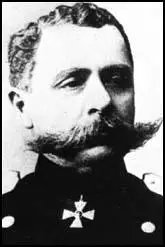Paul von Rennenkampf

Paul von Rennenkampf was born in 1854. He joined the Russian Army at 19 and six years later was sent to the Nikolaevsky Military Academy. After graduating in 1882 he was appointed to the General Staff and by 1900 had reached the rank of major-general.
Rennenkampf commanded a cavalry unit during the Boxer Rising (1900) and was responsible for the capture of Tsitsihar and Kirin. He also took part in the Russo-Japanese War (1904-05) but was criticised for his campaign in north-eastern Korea and was judged by The Times correspondent reporting the conflict as "a poor leader of men". After the Battle of Mukden in 1905, General Alexander Samsonov accused Rennenkampf of letting him down during the fighting and the two men came to blows.
After the Russo-Japanese War Rennenkampf regained some of his reputation when dealing with revolutionaries in Siberia. After this he was appointed Chief-of-Staff of the Vilno Military District.
On the outbreak of the First World War, Rennenkampf was given command of the Russian First Army for the invasion of East Prussia. His behaviour during the Battle of Tannenberg resulted in some members of the military high command trying to have him removed from office.
Rennenkampf was also criticised for his failure at the Battle of Lodz in November, 1914. This time he was dismissed and Rennenkampf retired to the Black Sea coast. Paul von Rennenkampf was killed in 1918 after refusing to join Bolshevik forces during the Russian Civil War.

